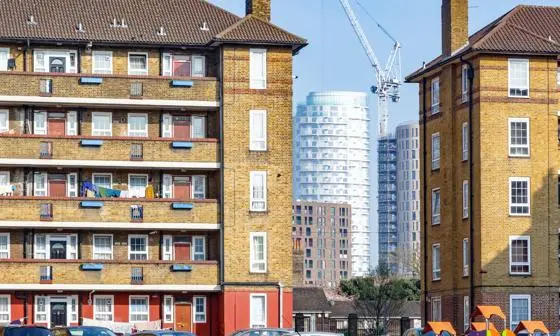Why don't we level up?

Contents
The idea of "levelling up" came to prominence during the 2019 UK General Election. In the run-up to the vote, Conservative Party leader Boris Johnson recognised that there were seats in the North of England that his party could potentially win if he promised them investment. These seats became widely known as "the Red Wall".
After Johnson won the election and the Red Wall turned blue, the new Prime Minister declared that the Conservative Party was going to "level up and unite the country". But what did he mean by "levelling up", and why has the UK government struggled to make good on this promise?
You can build a railway ... put a label on it and say ‘levelling up’. There’s a sort of cynical and, I think, entirely correct view that this is a piece of political opportunism.
What is levelling up?
What Johnson meant by levelling up was "a form of economic development across the country which is going to benefit people," explains Professor Neil Lee, Department of Geography and Environment at LSE, in a recent Research Showcase talk. "This is where the root of the idea of levelling up comes from."
As part of the levelling up agenda, a government department was renamed the Department for Levelling Up, Housing and Communities in 2021 and a 2022 Levelling Up White Paper set out 12 "missions" to achieve by 2030. Nonetheless, many believe that levelling up is little more than a policy branding exercise: "you can build a railway going from London to the North of England, you can put a label on it and say ‘levelling up’ - there’s a sort of cynical and, I think, entirely correct view that this is a piece of political opportunism," he says.
However, the spatial inequality that underpins the levelling up agenda isn’t unique to the UK. Regional disparities are a big issue across advanced economies, including Germany, France and the United States. "The United States is a great example, because some colleagues of mine – in particular, Andrés Rodriguez-Pose – talk about the revenge of the places that don’t matter." When we think about the rise of Donald Trump, Professor Lee notes, "people have made some quite big claims that, actually, what was happening here was that regional inequalities were somehow causing an instability in the political system. And this instability in the political system was deeply problematic."
Why don’t we level up?
Given the possible consequences of regional inequalities, it may seem there should be a clear pathway to levelling up. Professor Lee isn’t so convinced, citing his 20 years of research at LSE: "I’ve basically been doing research on what is now called levelling up," he says. "And throughout that whole time, I have been talking about the idea that somehow with these technocratic solutions, all we need to do is work out how to do it, and then we will do it. Then we will somehow level up."
Professor Lee shares an experience from LSE-funded policy work, undertaken with Max Herbertson, that shifted this thinking. "I remember vividly one of the first meetings we had with a senior politician. I went into this meeting and I said, ‘right, here is my list of technocratic things you should do’ … And basically, what she said was look, Neil, it’s not just about what we should do to level up. What really matters here, the real problem, is how I get people to vote for the stuff which will help us level up."
Professor Lee also credits his children with inspiring him to change his perspective: "They posed a slightly different question: rather than why should we level up, they said: why don’t we level up?"
London is rich because that’s where the rich people live. It sounds obvious to say, but it’s important to reflect on that.
The problem of measurement
The first reason we don’t level up, argues Professor Lee, is that regional disparities across the UK are very hard to measure. He cites a misleading graph from The Economist that looked at regional disparities in the OECD, presenting Britain as very regionally unequal compared to nations like France and Italy, saying: ‘‘The problem with measures like this is that they are highly dependent on the spatial scale at which you measure things."
So how can we improve the measurement of regional inequality? Professor Lee nods to an ESRC-funded project he is undertaking with ten other researchers to find answers that are "a little bit truer and get us a little bit closer to the picture". The key is examining comparable spatial units – in this instance, functional, local labour markets – over a longer period.
In doing so, the research team have found that the United States is the most unequal country they have studied by far. "To some extent, this is unsurprising. We know from the big picture studies done by people like the World Inequality Database that the United States is probably the most unequal of these countries." The research has also shown that the UK is worse on regional inequality than Germany and France. "But it’s no way near as bad as the United States. So, when we hear stories about the UK being the worst spatial inequality in the advanced world, I think we need to take that with a big pinch of salt."
The problem of economics
That is not to say that we shouldn’t be concerned about spatial inequality in the UK. After all, the other benefit of improved measurement is that researchers can better understand how regional disparities have changed over time. When we look at these measures, we can see "in the 1970s and early 1980s, the UK was more spatially equal than France. It’s only in the eighties and nineties that things started to spread out."
These patterns are partly linked to economics – the second challenge to levelling up. In the 1980s and 1990s, the UK economy experienced rapid deindustrialisation alongside a shift to the service industries, leading to a rise in regional divides. "Economic change has benefitted the type of industries we have in the South – consulting, real estate, finance. Many of the industries which a lot of LSE graduates will go on to work in. At the same time, deindustrialisation has been harmful to places outside of London and the South East," says Professor Lee.
London has been able to adapt due to agglomeration economies – the benefits that come from being located in a big city. "You can share resources, you can match jobs with workers, you can match suppliers and so on," he explains.
A large part of spatial inequality in the UK is therefore linked to London’s position as "a superstar city". "Basically, spatial inequality is driven by high earners. London is rich because that’s where the rich people live. It sounds obvious to say, but it’s important to reflect on that. These are the people who have benefitted from economic change, and these are what have been driving changing patterns of spatial inequality across many of these countries."
However, Professor Lee argues, economics is only a partial explanation of the barriers to levelling up in the UK. After all, other countries like France have similar urban structures and issues, but their outcomes have been very different.
Our institutions ... have not been well-adjusted to adapt to [our shift from a manufacturing to a service economy] as they might have been in other countries.
The problem of politics and policy
So what has been the key reason that we don’t level up in the UK? Professor Lee’s contention is that politics "has not driven a pro-levelling up policy agenda in this country for some time". Alongside economic transformation, the 80s and 90s saw radical changes to UK institutions, particularly around wage-setting and wage coordination. We’ve also seen huge policy churn and poor resilience in the face of shocks.
This is not an issue shared by other advanced economies – "this is a UK problem". When Professor Lee has looked at the most regionally equal OECD countries, they have shared features. "They have to have institutions which can take a long-term outlook; which can tailor policy to local circumstances; and have the budgets, the freedom, the flexibility, to make strategic choices and do what they need to do … Rather than, as we have in the UK, where national government tends to just talk down to local government."
Alongside this, "the other thing we lack in this country is any sort of incentives to accommodate growth." Professor Lee hasn’t found evidence of big regional variations in the likelihood that people will vote on the local economy, but he argues that voters in crucial swing seats tend to be more concerned by issues like social care or the NHS. This is "because they don’t have the incentives to benefit from it, the incentives to encourage growth".
Overcoming the barriers to levelling up
Levelling up remains a huge part of the policy agenda for the UK government because "the UK has pronounced spatial inequality." As Professor Lee argues, "if you are going to grow the UK economy, you need to do something in lagging regions."
But there are enduring barriers to levelling up too. "I think part of the problem here is an economic problem. We have shifted from a manufacturing economy to a service economy. That has benefitted certain parts of the country. But the real problem here has been that our institutions – particularly our political institutions – have not been well-adjusted to adapt to that as they might have been in other countries."
As long as these challenges remain, the question is not so much how the UK should level up – instead, how do we address the obstacles that stop us from doing so?
This LSE Research Showcase was written up by Rosemary Deller, Knowledge Exchange Support Manager at LSE.
Download a PDF version of this article




